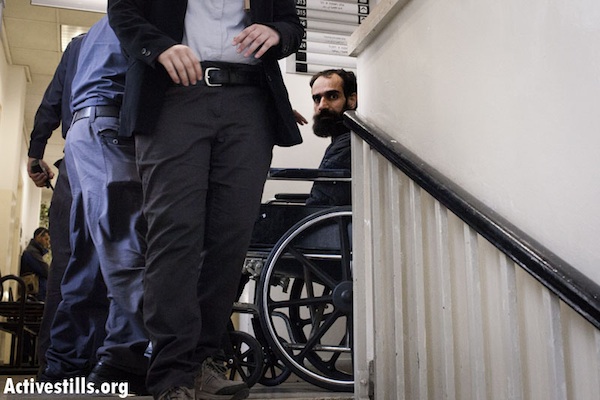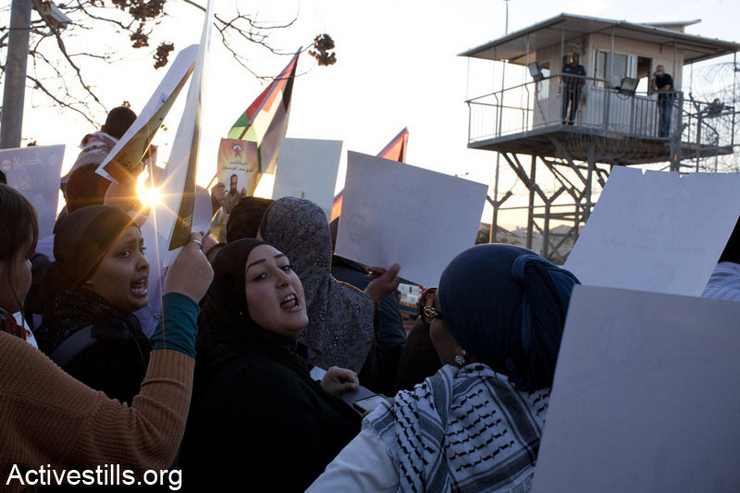Four Palestinian prisoners are on hunger strikes to protest their administrative detention and the conditions in which they are being held. While the EU calls on Israel to respect its obligations toward Palestinian prisoners’ human rights, an Israeli NGO reports they are being treated unethically in hospital.

All anyone in Israel has spoken about for the past week is ‘Prisoner X,’ the Jewish-Israeli-Australian Mossad agent held secretly by his own country, who supposedly took his own life in prison two years ago. But only a few miles from Israeli newsrooms in Jerusalem and Tel Aviv, outrage over a different type of prisoner in Israeli jails has been mounting for months and is coming to a head.
Four Palestinian men in Israeli prisons are currently in the late stages of prolonged hunger strikes protesting the legal basis of their imprisonment: administrative detention and military committee sentencing decisions based on secret evidence. Both amount to imprisonment without knowledge of what they are accused and without the right to a trial.
In recent days, at least one of the prisoners reportedly intensified his hunger strike, refusing all medical treatment, including vitamins and minerals. Their health is said to be deteriorating.
Thousands of Palestinians have taken to the streets throughout the West Bank in recent weeks, leading to violent clashes with the IDF and including protests that shut down the Ramallah offices of the Red Cross and UN.
Hundreds of Palestinian citizens of Israel have also protested in solidarity with the hunger strikers on the other side of the Green Line.

European Union foreign policy chief Catherine Ashton and Quartet envoy Tony Blair have both called on Israel to respect the human rights of Palestinian prisoners in accordance with its obligations in international law. Responding to the hunger strikers’ deteriorating health condition, Ashton said Saturday, “Under international law, detainees have the right to be informed about the reasons underlying any detention and to have the legality of their detention determined without undue delay.”
The Arab League has demanded the international community take responsibility and break its “unjustified silence” over the injustices Israel subjects Palestinian prisoners to.
In its preparations for U.S. President Obama’s upcoming visit to Jerusalem and Ramallah, the Palestinian government is also reportedly pushing the issue of prisoners to the top of its agenda.
The longest of the hunger strikes is reported to be around 200 days, although it was not clear if it has been continuous. Samer Issawi was released as part of the Gilad Shalit prisoner exchange in October, 2011, having served 10 years of a 30-year sentence. He began his hunger strike nine months later, shortly after the IDF re-arrested him. Issawi is protesting the legal mechanism that put him in prison without access to due process. He was re-sentenced by a military committee using secret evidence that neither he nor his lawyers can see, and therefore cannot mount a defense in court.
Ayman Sharawna was also re-arrested and sentenced under similar conditions using secret evidence, thereby denying him the ability to defend himself in court.
Two other prisoners on hunger strike, Jafar Azzidine and Tareq Qa’adan, are being held in administrative detention; they were never charged with a crime, told what they are accused of or given a chance to defend themselves or clear their names. Those two men have been on a continuous hunger strike for 84 days and are being held at a medical facility in Ramle Prison. According to Physicians for Human Rights, they are not eating but are drinking and receiving some minerals and vitamins.
Administrative detention, which is permissible under international law only in extreme cases to prevent immediate and grave dangers, is widely abused by Israel to imprison Palestinians. During a mass, 1,400-prisoner hunger strike last year to protest the practice, Israel was said to be holding over 300 Palestinians in administrative detention. Acknowledging the legally problematic nature of the practice, even the most senior Israeli security officials have admitted it is unnecessary.
But beyond the highly problematic and illegal (under international law) mechanisms for detaining them, Israel’s treatment toward the hunger strikers defies its own laws and regulations, medical ethics and international conventions, Israeli NGO Physicians for Human Rights (PHR) wrote in a statement.
After petitioning Israeli courts to demand visits with the hunger striking prisoners, PHR recently met with and examined Azzidine and Qa’adan. They were are kept shackled in their hospital beds overnight and are being denied family visits, despite being in danger of dying, the statement said.
The main health danger for hunger strikers, PHR’s executive director Ran Cohen told +972 is that heart failure can take place without any warning, at any time.
Azzidine and Qa’adan were recently brought to Assaf Harofe Medical Center against their will and underwent medical testing despite their refusal to be treated, they told a lawyer representing PHR, Cohen said. The prisoners refused to be taken to civilian hospitals unless they were given guarantees they will not be shackled to their beds, which goes against Israeli Medical Association and Israel Prison Service regulations. Nonetheless, after being physically forced to go to the hospital, the two reported that their wrists and ankles were shackled to their beds overnight during their hospitalization.
“Israel’s use of administrative detention based on military regulations to incarcerate individuals without trial is evidence that this is but one more tool used to repress residents of the occupied territories,” a PHR statement asserted.
“The fact that medical personnel are also involved, the violations of the right to health and the courts failure to preserve the inmates’ rights is evidence of Israel’s widespread and systemic moral, ethical and professional failures,” the statement added.
Israeli courts are set to hear appeals in two cases relating to the hunger strikers in the coming days. One of the cases is challenging the military committees that sentenced the men, and the second is by PHR seeking regular access to the hunger strikers.
On a separate but related note, a PLO official reportedly said U.S. Ambassador Dan Shapiro promised him Israel would release 550 Palestinian prisoners ahead of Obama’s visit in the coming weeks, according to Israeli daily Ma’ariv on Monday. (Hebrew)
Update (Tuesday, Feb 19):
On Tuesday, 800 Palestinian detainees in Israeli prisons began a one-day hunger strike in solidarity with the four hunger strikers, Palestinian prisoner support and human rights NGO Addameer reported.
Update 2 (Tuesday, Feb 19):
The Jerusalem Magistrate’s Court rejected a request to release Samer Assawi earlier Tuesday. His next hearing is scheduled for March 14.
Read a recent letter by Samer Issawi describing the reasons for his determination to continue his hunger strike here.


